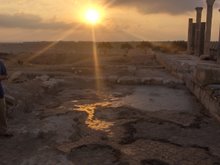Prior to our initial week of digging, we took our first weekend trip to Gadara, the modern city of Umm Qais and one of the ancient cities of the Decapolis. Excavation at Gadara is extensive, exhibiting Hellenistic and Roman architecture (three theaters, a temple, an octagonal basilica, a Roman bath house, paved streets, vaulted shops and colonnades). The city overlooks both the Sea of Galilee and northern Israel to the west. This is likely the same Gadara mentioned in each of the three Synoptic gospels as the land of the Gadarenes (Matt 8.28; Mk 5.1; Lk 8.26), where Jesus purportedly cast the legion of demons into a herd of swine. I find it interesting to read the biblical narrative of Jesus' interaction with the Gadarene demoniac while keeping in mind the city's proximity to the Sea of Galilee. Matthew records, “And [Jesus] said to them, 'Go.' So they came out and went into the swine; and behold, the whole herd rushed down the steep bank into the sea, and perished in the waters” (Matt 8.32 RSV). Gadara is actually no less than ten miles distant from the sea, meaning the herd of swine would have ran a long distance to the waters below.











No comments:
Post a Comment